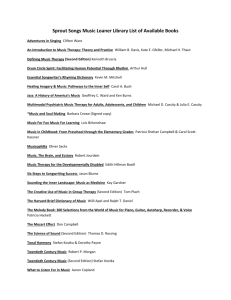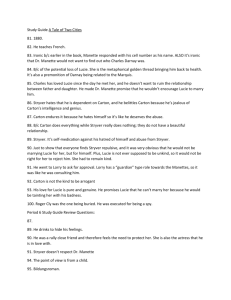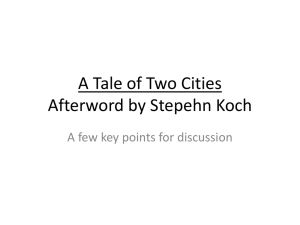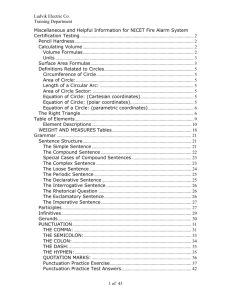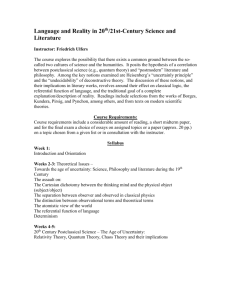The Joke - Miguel Llora
advertisement
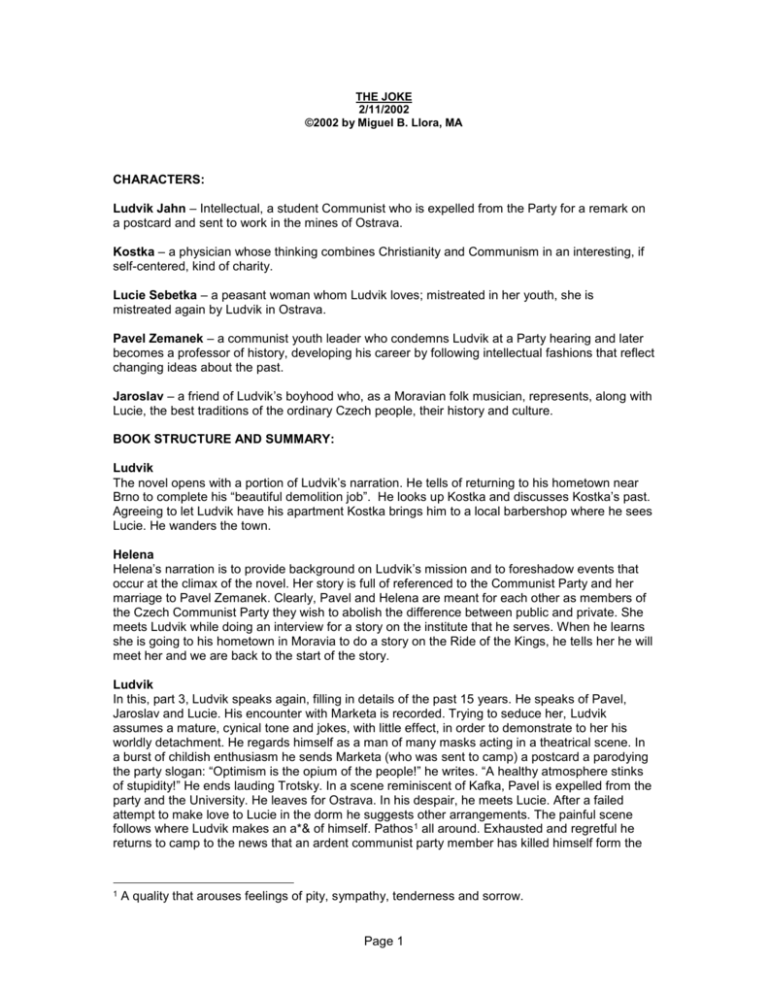
THE JOKE 2/11/2002 ©2002 by Miguel B. Llora, MA CHARACTERS: Ludvik Jahn – Intellectual, a student Communist who is expelled from the Party for a remark on a postcard and sent to work in the mines of Ostrava. Kostka – a physician whose thinking combines Christianity and Communism in an interesting, if self-centered, kind of charity. Lucie Sebetka – a peasant woman whom Ludvik loves; mistreated in her youth, she is mistreated again by Ludvik in Ostrava. Pavel Zemanek – a communist youth leader who condemns Ludvik at a Party hearing and later becomes a professor of history, developing his career by following intellectual fashions that reflect changing ideas about the past. Jaroslav – a friend of Ludvik’s boyhood who, as a Moravian folk musician, represents, along with Lucie, the best traditions of the ordinary Czech people, their history and culture. BOOK STRUCTURE AND SUMMARY: Ludvik The novel opens with a portion of Ludvik’s narration. He tells of returning to his hometown near Brno to complete his “beautiful demolition job”. He looks up Kostka and discusses Kostka’s past. Agreeing to let Ludvik have his apartment Kostka brings him to a local barbershop where he sees Lucie. He wanders the town. Helena Helena’s narration is to provide background on Ludvik’s mission and to foreshadow events that occur at the climax of the novel. Her story is full of referenced to the Communist Party and her marriage to Pavel Zemanek. Clearly, Pavel and Helena are meant for each other as members of the Czech Communist Party they wish to abolish the difference between public and private. She meets Ludvik while doing an interview for a story on the institute that he serves. When he learns she is going to his hometown in Moravia to do a story on the Ride of the Kings, he tells her he will meet her and we are back to the start of the story. Ludvik In this, part 3, Ludvik speaks again, filling in details of the past 15 years. He speaks of Pavel, Jaroslav and Lucie. His encounter with Marketa is recorded. Trying to seduce her, Ludvik assumes a mature, cynical tone and jokes, with little effect, in order to demonstrate to her his worldly detachment. He regards himself as a man of many masks acting in a theatrical scene. In a burst of childish enthusiasm he sends Marketa (who was sent to camp) a postcard a parodying the party slogan: “Optimism is the opium of the people!” he writes. “A healthy atmosphere stinks of stupidity!” He ends lauding Trotsky. In a scene reminiscent of Kafka, Pavel is expelled from the party and the University. He leaves for Ostrava. In his despair, he meets Lucie. After a failed attempt to make love to Lucie in the dorm he suggests other arrangements. The painful scene follows where Ludvik makes an a*& of himself. Pathos 1 all around. Exhausted and regretful he returns to camp to the news that an ardent communist party member has killed himself form the 1 A quality that arouses feelings of pity, sympathy, tenderness and sorrow. Page 1 taunts about his expulsion form the party. It is a lyrical time. At the end of this section, we are 15 years afterwards and we find Ludvik with Lucie but the situation if different now. Jaroslav This section features Jaroslav, Ludvik boyhood friend who leads a traditional folk band. Here Kundera gathers through the voice of Jaroslav various intellectual and narrative strands, including Moravian legend, fantasy, musicology, personal reminiscence, and history, along with a discussion on the cultural relationship between Communist ideology and Czech folk values. We learn about the Ride of the Kings and Jaroslav’s personal involvement and his wish to pass it on to his son. The beat goes on….. Ludvik In this, part 5 Ludvik speaks again. He provides us with details on Zemanek, the Party and his mission of vengeance with Helena – but first we get an extend explanation of his love for Lucie. He compares his love to Hamlet’s love for Ophelia. With those thoughts in mind he strays into the town hall to witness the equivalent to a civil christening, a “welcoming of new citizens to life’. Thus begins his actual seduction of Helena and the ironic reversal – unaware that she and Pavel no longer live as man and wife, Ludvik thinks the ultimate insult will be invading their privacy by taking Pavel’s place in bed with Helena. However, she spoils his satisfaction and revenge by telling him that she and Pavel no longer sleep together. Kostka All of a sudden Kundera gets rather Dostoevskian on us. After having done his dirty deed, Ludvik turns it over to Kostka. We get an earful (more like and eyeful) of Kostka’s Christianity. This is supposed to counter Ludvik’s dark and difficult time, but hold on. Before that, let me digress, while Ludvik’s independence lies along cynical and pessimistic lines of reason and doubt, Kostka’s is founded on religion – the Party likes neither and banishes them both. Both meet and fall in love with Lucie in their “banishment” with different results. The story rings more Dostoevsky with reversals of Raskolnikov/Sonya in Kostka/Lucie – with Kostka’s references to religion and her redemption through suffering, how loudly does Dostoevsky through Janacek have to ring loudly. Anyway, it is all an illusion. While Kostka’s demeanor seems positive, the truth is both him and Lucie are stuck in loveless relationships – Lucie suffering in silence waiting for Kostka to gain the guts enough to take her back and simply enjoys the fleeting meetings. “Oh, how I delude myself!” he cries. Don’t we all? Ludvik, Jaroslav, Helena Last, but not least, we come to the final section. This part comprises 19 sections or “chapters” the odd ones narrated by Ludvik, the even ones divided unequally between Jaroslav and Helena. This allows Kundera to bring simultaneous action from several points of view. The first chapter begins with irony and a complaint, Ludvik’s observation that in his hometown he can find no breakfast for the second day in a row. Ludvik meets Zemanek and his new girlfriend Miss Broz. In this chapter Ludvik finally tells Helena that he does not love her and won’t see her any more. She writes a note to Ludvik telling him she loved him body and soul and that, since he has left her “body and soul…. Have nothing to live for”. When Ludvik reads the letter, he and Jindra (the young assistant) run to the District Council building and find Helena in an outhouse. Tragicomic at its finest. Here we also learn that Jaroslav finds out that his son is at the motorcycle races. His wife defends Vladimir, saying he didn’t like the use of privilege that got him the role of the king, but Jaroslav counters by asking why Vladimir associates with the grandson of the “petty bourgeois” Koutecky’s. Ludvik in his despair asks to play in the band. As they continue to perform Jaroslav collapses from a heart attack. The novel ends when Ludvik and the others lift Jaroslav from the floor, escorting him through the crowd while members of the indifferent audience break out in a fight in a distant corner. We are left to contemplate. -oOo- Page 2 The Joke, which appeared to great acclaim in Czechoslovakia in 1967 – studies the human loss resulting from institutional evaluation. (1) How do you think this fits in with Kundera’s oeuvre? Kostka’s narration works as a foil to Ludvik’s, his voice of compassion representing an optimistic view than can overlook Stalinist obsession with power and combine Christian ethics with the more sober rationalism of Marxist thinking. (2) Does it really? What do you think? Jaroslav’s brief narration may be seen as central to the novel, its attention to folk customs containing some of the most interesting and trenchant 2 cultural commentary that Kundera has written. Jaroslav speaks of music and the past, his autobiographical past (as a student with Ludvik) and the nation’s, or the people’s, past, which he single-mindedly identifies with folk traditions. (3) Is this Kundera’s instrument for “remembering” or “looking for the best for preservation”? (4) If he had fears as early as ’67 for the Czech language being relegated to the level of a European dialect and its culture to that of folklore, is it beneficial to play up the Ride of the Kings? (5) What do you think it does as a statement of cultural preservation? Helena’s character; in a pointed contrast to Jaroslav and Lucie, epitomizes 3 post-Stalinist Czech culture (and contemporary European culture in general), with its emphasis on the future as opposed to the past, fashion as opposed to tradition, and the urban value of achieving social status through political association. (6) How successful do you think Kundera is at caricaturing both sides of this dichotomy? Kundera, in The Book of Laughter and Forgetting introduces a character called Tamina. Tamina and her desire for privacy. In many ways Tamina parallels those characteristics of Lucie Sebetka in The Joke. In an almost Kafkaesque examination of Public vs. Private, where the two seem to converge and the need for preservation is represented by both. (7) What is your initial impression of the dilemma of Lucie Sebetka? Both are countrywomen who represent the best impulses of the Czech people, yet both suffer because of the Party, sexual ill treatment, and the loss of important loves. Both also suffer in silence, isolated among strangers, giving comfort to others, especially men, by ministering to basic needs, drinking or barbering, and listening to them talk. (8) Is this representation problematic? (9) Would you consider this coming from a position of strength or weakness? (10) What to think about Kundera, being a man, representing inner feelings of women – is he accurate (for a lack of a better word)? (11) Is this a vision of male fantasy? (12) Being that Helena is seem to represent the fusion of the public and private, within this framework, is it easier to feel for their suffering rather than with Helena? 2 Forceful and effective; vigorous: a trenchant argument. Extremely perceptive; incisive. Caustic; cutting. Distinct; clear-cut. 3 To be a typical example of. Page 3 Though lacking in social status, the two women represent Czech (and human) nature at its most generous, their nobility being a matter of inner strength and kindness rather than position or title. (13) Would you agree? Lucie and Tamina gain respect because, in trying circumstances, they seem to know who they are and remain true to the privacy of their inner selves. In that sense they belong to the vision of the world expressed by Kostka, while Helena belongs to the world of props and scenery described by Ludvik4. (14) Do you agree? In the United States of the 1980’s we would have probably called her a yuppie, and it is precisely that self-serving side of her and Pavel that Ludvik is on a mission to destroy. (15) Would you agree with the assessment? (16) Would you agree that that is what Ludvik is really trying to destroy? (17) What does Ludvik represent anyway? Lucie5 exists outside of politics, and while he had always seen the Communist Party as the center of history and life, he learns from Lucie the value of the trivial, the ahistorical ordinary events of daily life. (18) In an apparent twist of fate, is Kundera subject to his own circularity and falls under the spell of Kitsch? (19) Is Lucie Kitschy? In part 3, Kundera’s thematic intentions become clearer. While he says in his preface that The Joke is a love story, the overlay of national, social, and political history in the actual narrative has serves to obscure the emotional event. (20) Has it? (21) What does this say about the events? (22) It is clear that Kundera is making a statement about 1950s Stalinist Communism. What does it speak to you? (23) Kundera does not want to be pigeonholed as anti-Stalinist. He wishes his legacy to include wider existential issues – those discussed in the Art of the Novel. What if anything can you bring in from the Art of the Novel at this time? 4 Ludvik see reality as made up of background and sets, underlining his view that life is inherently false, a drama played before an artificial scene. But he recognizes that Kostka’s more traditional humanistic view (with God constructing reality, not sets) makes an adequate complement to his own beliefs. In this sense, The Joke becomes a philosophical dialogue between those two views: traditional humanism with its emphasis on religion and individuality, and contemporary modernism with its emphasis on social politics and doubts about the viability of the self. 5 Ludvik’s love of Lucie and his relations with Market and Helena represent a philosophic exploration of body and soul, a dialogue about their relative importance in determining what is essentially human, what is essentially self. The novel asks, What are these feelings we call love and desire? What do they say about our possibilities, especially in a world where historical events have eclipsed the notion of a solid foundation to human character and us? Page 4 If The Joke is a love story, then the reader must understand that it is about love in a complex sense: love of country and of self, love of traditions, future and past, as well as the varieties of love between men and women. (24) Thoughts? Reactions? Ludvik’s seduction scene is intricate, difficult to understand, and more difficult to like, particularly in light of current understanding of sexual relations and power. The idea that a man would use a woman to gain revenge on another man repulses us (I hope…) and it is very difficult not to condemn Ludvik’s actions or thoughts here and, by extension, not to condemn Kundera for voicing them through his principal character. (25) Thoughts? Reactions? (26) Is this advocacy or parody? (27) What does this tell us about the human possibilities? (28) What impact does this have on the considerations of the self? Where Ludvik fails, Kostka succeeds, helping her win back self-confidence and trust after her experience with Ludvik has driven her into retreat from other people. She and Kostka become confidants. He learns that her father beat her and that, in rebellion, Lucie took up with a gang of boys who abused her sexually until one day the police burst in and arrested them (and her). Ironically, the police charge theft. After a year in reformatory Lucie leaves for Ostrava – enter Ludvik. Her experience in the minors’ room echoes so strongly she never want to see him again. (29) Can you blame her? While Kostka’s demeanor seems positive, the truth is both him and Lucie are stuck in loveless relationships – Lucie suffering in silence waiting for Kostka to gain the guts enough to take her back and simply enjoys the fleeting meetings. “Oh, how I delude myself!” he cries. (30) Don’t we all? Very little is as it appears. Ludvik’s little postcard humor transforms his own life, not Marketa’s. Helena seeks love and receives vengeance instead. Ludvik, seeking love from Lucie, sends her away into Kostka’s life. And Kostka, teaching the ways of spirit, falls into the morass of the flesh. Everything works opposite from the characters’ expectations. (31) This calls into question our perceptions about life, purpose, each other, and ourselves. What does it say to you? Closing questions: (32) How does all this tie in with what Kundera wrote in The Art of the Novel? (33) What does this say about his Authorial Function? (34) What would you have gotten out of it if you had just engaged in the text and not the extended “discourse” around Kundera? (35) Are Barthes and Foucault rolling in their grave? What do you think? (36) Are you ready for The Unbearable Lightness of Being? -oOo- Page 5
